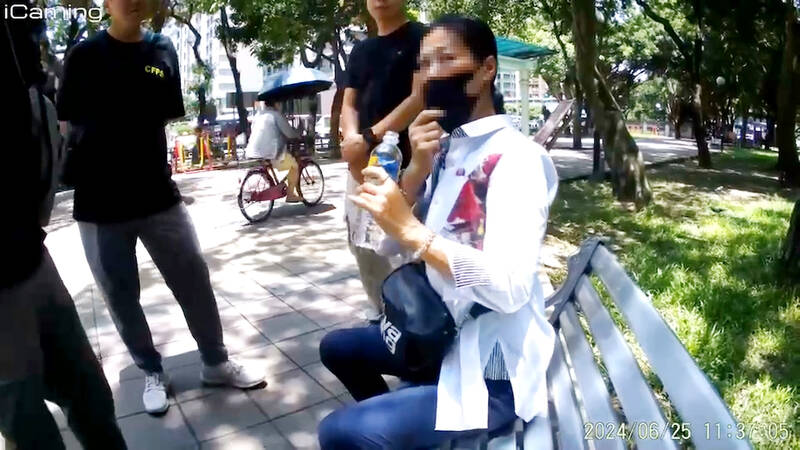A woman in New Taipei City was defrauded of NT$2.64 million (US$81,116) by scammers who used artificial intelligence (AI) apps to deceive her into believing that she was interacting with Hong Kong entertainer Andy Lau (劉德華).
The New Taipei City Police arrested a women believed to be part of the scamming operation, after the victim, a women surnamed Lin (林), and her family members reported their suspicion that Lin had been scammed.
Lin, 62, was quoted by the police as saying that she is a long time fan of Lau, who flourished in the Hong Kong film and entertainment business in the 1980s and 1990s.

Photo copied by Hsu Sheng-lun, Taipei Times
She said the scamming started last year when she visited what she believed was Lau’s personal fan Web site, and that a few minutes later, she received a message form someone claiming to be Lau.
Lin said she did not believe it was him until she had a video call with him, her statement to the police showed.
Lin said that “Lau” spoke to her about coming to Taiwan in the summer, and would need NT$2.6 million to pay for accommodation, security, dinner and other expenses, adding that he told her that he is asking fans to donate money to make the visit happen.
Lin borrowed money and wired NT$2.64 million to the bank account “Lau” provided her.
Lin’s family members were suspicious that it was a scam, and took her to the local police precinct to report it.
The police said it was a fake, using AI to generate Lau’s voice, face and movements.
To catch the scammers, the police asked Lin to ask them if she could make a NT$150,000 payment in cash in person. She arranged with the scammers to meet at a park in Sanchong District (三重) last week.
A woman surnamed Chuang (莊) showed up at the public park to receive the cash, and was arrested by plainclothes police officers.
At first, Chuang said she was a member of staff of Lau’s publicity firm, but could not answer any follow up questions in any detail.
Police said she admitted that she was instructed to collect the money, but denied it was part of a scamming operation.

Taiwan has received more than US$70 million in royalties as of the end of last year from developing the F-16V jet as countries worldwide purchase or upgrade to this popular model, government and military officials said on Saturday. Taiwan funded the development of the F-16V jet and ended up the sole investor as other countries withdrew from the program. Now the F-16V is increasingly popular and countries must pay Taiwan a percentage in royalties when they purchase new F-16V aircraft or upgrade older F-16 models. The next five years are expected to be the peak for these royalties, with Taiwan potentially earning

STAY IN YOUR LANE: As the US and Israel attack Iran, the ministry has warned China not to overstep by including Taiwanese citizens in its evacuation orders The Ministry of Foreign Affairs (MOFA) yesterday rebuked a statement by China’s embassy in Israel that it would evacuate Taiwanese holders of Chinese travel documents from Israel amid the latter’s escalating conflict with Iran. Tensions have risen across the Middle East in the wake of US and Israeli airstrikes on Iran beginning Saturday. China subsequently issued an evacuation notice for its citizens. In a news release, the Chinese embassy in Israel said holders of “Taiwan compatriot permits (台胞證)” issued to Taiwanese nationals by Chinese authorities for travel to China — could register for evacuation to Egypt. In Taipei, the ministry yesterday said Taiwan

Taiwan is awaiting official notification from the US regarding the status of the Agreement on Reciprocal Trade (ART) after the US Supreme Court ruled US President Donald Trump's global tariffs unconstitutional. Speaking to reporters before a legislative hearing today, Premier Cho Jung-tai (卓榮泰) said that Taiwan's negotiation team remains focused on ensuring that the bilateral trade deal remains intact despite the legal challenge to Trump's tariff policy. "The US has pledged to notify its trade partners once the subsequent administrative and legal processes are finalized, and that certainly includes Taiwan," Cho said when asked about opposition parties’ doubts that the ART was

If China chose to invade Taiwan tomorrow, it would only have to sever three undersea fiber-optic cable clusters to cause a data blackout, Jason Hsu (許毓仁), a senior fellow at the Hudson Institute and former Chinese Nationalist Party (KMT) legislator, told a US security panel yesterday. In a Taiwan contingency, cable disruption would be one of the earliest preinvasion actions and the signal that escalation had begun, he said, adding that Taiwan’s current cable repair capabilities are insufficient. The US-China Economic and Security Review Commission (USCC) yesterday held a hearing on US-China Competition Under the Sea, with Hsu speaking on